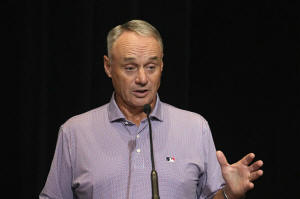ESPN and Major League Baseball will
end their national television deal after 2025 season
 Send a link to a friend
Send a link to a friend
 [February 21, 2025]
By JOE REEDY [February 21, 2025]
By JOE REEDY
ESPN's coverage of Major League Baseball games — at least in its
current form — will conclude at the end of the 2025 season.
ESPN chairman Jimmy Pitaro informed baseball Commissioner Rob
Manfred on Thursday morning that the network was opting out of the
final three years of its contract, two people told The Associated
Press on condition of anonymity because because they weren’t
authorized to discuss financial matters.
ESPN and MLB both made statements Thursday night confirming the end
of the current rights deal.
There was a March 1 deadline for MLB and ESPN to opt out of the
final three years of their contract. The sides agreed to a
seven-year deal in 2021 that averaged $550 million per season.
“We have had a long and mutually beneficial partnership with ESPN
that dates back to its first MLB game in 1990," MLB said in a
statement. "Unfortunately in recent years, we have seen ESPN scale
back their baseball coverage and investment in a way that is not
consistent with the sport’s appeal or performance on their platform.
Given that MLB provides strong viewership, valuable demographics,
and the exclusive right to cover unique events like the Home Run
Derby, ESPN’s demand to reduce rights fees is simply unacceptable."
The ESPN-Major League Baseball split was first reported by The
Athletic.

Manfred wrote in a memo to owners obtained by The Associated Press
that MLB and ESPN “mutually agreed to terminate our agreement."
ESPN has carried MLB games since 1990, but the network cut back its
coverage in the current contract to 30 regular-season games — mostly
on Sunday night — and the Wild Card postseason series. ESPN also had
the Home Run Derby and 10 spring training games.
The previous eight-year deal, which ran from 2014 through 2021, saw
ESPN broadcast up to 90 regular-season games. It also stopped airing
the daily “Baseball Tonight” highlights and news show in 2017.
“We are grateful for our longstanding relationship with Major League
Baseball and proud of how ESPN’s coverage super-serves fans. In
making this decision, we applied the same discipline and fiscal
responsibility that has built ESPN’s industry-leading live events
portfolio as we continue to grow our audience across linear, digital
and social platforms,” ESPN said in a statement. “As we have been
throughout the process, we remain open to exploring new ways to
serve MLB fans across our platforms beyond 2025.”
ESPN has had the rights to all four U.S. major professional sports
leagues since getting back the National Hockey League in 2021. It
will pay an average of $1.4 billion when the new 11-year agreement
with the NBA begins next season and pays an average of $2.7 billion
per season on its NFL deal, which runs through 2032.
Major League Baseball receives an average of $729 million from Fox
and $470 million from Turner Sports per year under deals which
expire after the 2028 season.
[to top of second column] |

MLB Commissioner Rob Manfred speaks during a news conference
Tuesday, Feb. 18, 2025, in Phoenix. (AP Photo/Ross D. Franklin)

ESPN is still open to pursuing a deal with a
reduced rights fee after seeing deals struck with Apple and Roku.
Apple pays $85 million per season for a Friday night package it has
aired since 2022, while Roku's deal for Sunday afternoon games is
worth $10 million per year.
While Manfred said in his memo to owners that “as of December 2024,
ESPN was available in 53.6M homes, down from its peak of over 100M
homes in 2011 and 69M homes when we struck the current deal in
2021,” that is still a larger distribution pool compared to Apple
and Roku.
“While ESPN has stated they would like to continue to have MLB on
their platform, particularly in light of the upcoming launch of
their DTC (direct-to-consumer) product, we do not think its
beneficial for us to accept a smaller deal to remain on a shrinking
platform,” Manfred wrote. “In order to best position MLB to optimize
our rights going in to our next deal cycle, we believe it is not
prudent to devalue our rights with an existing partner but rather to
have our marquee regular season games, Home Run Derby and Wild Card
playoff round on a new broadcast and/or streaming platform.”
MLB also said in its statement that “the positive energy around the
sport has also led to significant interest from both traditional
media companies and streaming services who would like to obtain
rights to MLB games."
Manfred has said over the past two seasons that he would like to see
MLB take a more national approach to its rights instead of a large
percentage of its games being on regional sports networks.
“We’re blessed with a huge amount of content: 2,430 games. Because
of the amount of content, I think there will be some local component
but I think the strategy needs to be more national and our reach
needs to be more national," he said during a panel discussion last
September at the CNBC x Boardroom’s Game Plan event.
___
Associated Press baseball writer Ronald Blum contributed to this
report.
All contents © copyright 2025 Associated Press. All rights reserved
 |